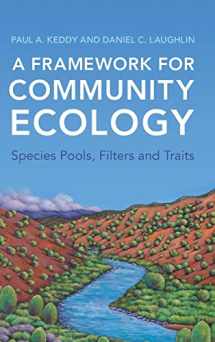
A Framework for Community Ecology: Species Pools, Filters and Traits
Book details
Summary
Description
This book addresses an important problem in ecology: how are communities assembled from species pools? This pressing question underlies a broad array of practical problems in ecology and environmental science, including restoration of damaged landscapes, management of protected areas, and protection of threatened species. This book presents a simple logical structure for ecological assembly and addresses key areas including species pools, traits, environmental filters, and functional groups. It demonstrates the use of two predictive models (CATS and Traitspace) and consists of many wide-ranging examples including plants in deserts, wetlands, and forests, and communities of fish, amphibians, birds, mammals, and fungi. Global in scope, this volume ranges from the arid lands of North Africa, to forests in the Himalayas, to Amazonian floodplains. There is a strong focus on applications, particularly the twin challenges of conserving biodiversity and understanding community responses to climate change.
Book Description
Offers a unifying framework for community ecology by addressing how communities are assembled from species pools.


We would LOVE it if you could help us and other readers by reviewing the book
Book review



